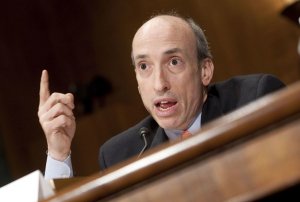“Make no mistake: It doesn’t matter whether it’s a stock token, a stable value token backed by securities, or any other virtual product that provides synthetic exposure to underlying securities.”

Gary Gensler, Chair of the Securities and Exchange Commission, spoke about security-based swaps before the American Bar Association Derivatives and Futures Law Committee.
He started off by noting that “I’m not speaking on behalf of my fellow Commissioners or the SEC staff”. This short sentence is now vital as the agency prepares to face the deposition of ex-SEC Director William Hinman for a speech he gave about the nature of Ether – “not a security” – in 2018.
The SEC Chair spoke about security-based swaps in the aftermath of the Archegos meltdown and the SEC’s completion of the implementation of derivatives oversight in the United States, eleven years after Dodd-Frank.
At the end of the speech, Mr. Gensler mentioned the intersection of security-based swaps and financial technology, including with respect to crypto assets.
“There are initiatives by a number of platforms to offer crypto tokens or other products that are priced off of the value of securities and operate like derivatives”, said the SEC Chair.
“Make no mistake: It doesn’t matter whether it’s a stock token, a stable value token backed by securities, or any other virtual product that provides synthetic exposure to underlying securities. These platforms — whether in the decentralized or centralized finance space — are implicated by the securities laws and must work within our securities regime.
“If these products are security-based swaps, the other rules I’ve mentioned earlier, such as the trade reporting rules, will apply to them. Then, any offer or sale to retail participants must be registered under the Securities Act of 1933 and effected on a national securities exchange”, he added.
The SEC has already filed complaints against retail offerings of security-based swaps and is likely to charge more blockchain firms in the near future.
FinanceFeeds has recently covered the phenomenon of tokenization of assets and named Binance as one of the leading firms already offering such products, having started with a tokenized version of the Tesla stock (TSLA) as the operator aims to allow non-U.S. based users to trade the instrument and many more after that.
Binance, among a growing number of firms, could be meaning to bypass the regulatory framework in the United States and other jurisdictions. The counterreaction is what we’re seeing today: a global crackdown on Binance.
Ripple is also venturing into asset tokenization utilizing its renowned XRP Ledger, RippleNet’s General Manager Asheesh Birla announced earlier this month.
“Tokenization is transforming how people buy, sell, track and manage assets – everything from art and real estate to intellectual property, equities, and supply chain goods. In fact, the World Economic Forum projects 10% of the world’s GDP will be tokenized by 2027”.
“We’re expanding from a cross-border payments network to a platform providing tokenized services that will bring crypto capabilities to the enterprise and prepare them for a future where crypto is front and center. RippleNet was initially built to solve the challenges with speed, cost, and transparency in cross-border payments for those that have been grossly underserved by the financial system at large.”
The Asia Pacific’s progressive crypto regulation is probably where Ripple will find momentum for its new product, but there is no lack of clarity in regard to blockchain-powered products that provide exposure to underlying securities: they are implicated by the US securities laws. SEC Chair Gary Gensler made that abundantly clear.
Ripple gains higher ground for XRP, SEC plagued with top-level infighting
Lack of clarity has been a very serious issue within the crypto ecosystem in the United States. So much so that this week, SEC Commissioners Hester Peirce and Elad Roisman have made public statements that admit to that – “a gift from the heavens“, said attorney Jeremy Hogan.
The admission of lack of clarity from top SEC officials will be used by Ripple and the individual defendants to support its fourth affirmative defense and the motion to dismiss the case, respectively.
The bombshell comes in good timing for the Ripple counsel, who will have ex-SEC Director William Hinman depose on July 27 in order to further strengthen its fair notice defense.
The following day, July 28, is the deadline for the requested response from SEC Chair Gary Gensler to Senator Elizabeth Warren. She has requested information about the regulator’s “authority to properly regulate cryptocurrency exchanges and to determine if Congress needs to act to ensure that the SEC has the proper authority to close existing gaps in regulation”.
That letter also sent shock waves of speculation regarding what could be deemed as an orchestrated powerplay to outflank the CFTC.
